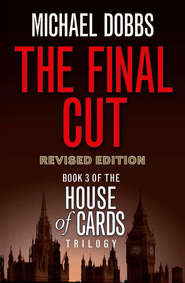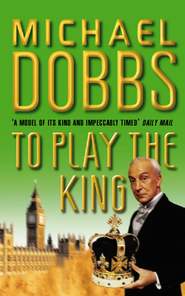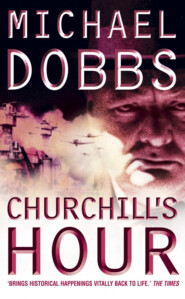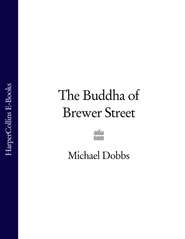По всем вопросам обращайтесь на: info@litportal.ru
(©) 2003-2025.
✖
Goodfellowe MP
Настройки чтения
Размер шрифта
Высота строк
Поля
It was the journalist’s turn to show amusement. ‘With my accent? You think I got that at university? No, Mr Corsa, I’m Oldham, not Oxford. Rugby league and Tandoori takeaway, that’s me, and I’ll waste your money on the finest claret only if it gets me a story. There’s nothing academic about me. I didn’t need books to understand the way the City men think. All I needed was a mirror.’
‘So we’re all avaricious, are we?’
‘Single-minded. Know what we want.’
‘And what do you want?’
Gooley looked carefully around the penthouse. His eyes were not adjusted to appreciate the refinement, the glow of Lalique, the elegant discomfort of the Mackintosh chairs. He was simply lost in the size of it all. ‘I’ll bet you’ve got a hundred silk ties in your wardrobe.’
‘A hundred and fifty.’ Corsa exaggerated, but the younger man’s eyes remained direct, disarmingly uncomplicated.
‘I want this, or something like this,’ he breathed. ‘I want to be part of it all. That’s why I want the opportunity to be your City Editor.’
Corsa’s appreciation of the man grew. ‘But along with the opportunities also go responsibilities. To me. I’m very much a hands-on proprietor. The City is my world, too, and I don’t like being taken by surprise.’
‘Fair enough.’
‘I’m talking a two-way relationship. I tell you what I know; you return the confidence. I want to feel it’s a team effort.’ Corsa was an excellent player of this particular game, flattering his journalists and editors into subservience, leaving their professional integrity intact while ensuring they did precisely what he intended. ‘It’s not that I want any inside information, you understand, but I need to know you’ve got your finger on the pulse. That the stories you print are well founded and not simply dreamed up over lunch. Understood?’
‘Sharing inside information with you would be highly unethical’ – Gooley paused for no more than the beating of a wing – ‘if you were to use it. I feel sure our relationship would be based on a deep and mutual trust. If I were your City Editor.’
‘Good. Very good.’ Corsa mused, then made up his mind. The present incumbent could go chew nut buns. ‘Very well, Jim, in the spirit of mutual trust let me give you something. News which you will be the first to hear. Not for printing yet, but I want you to think about it. You know that the Granite Group is the best damn company in the newspaper field, but the others are always snapping at us. And when these new European regulations come in there’s going to be one hell of a dog fight. So we are going to be as lean and as fit and as mean as possible.’
Corsa made chopping motions with his hand. Gooley nodded.
‘It means that our friend the current City Editor isn’t going to be the only one asked to fall upon his pen. I’ll be announcing more economies, more streamlining.’
‘You mean more sackings at mill.’ The journalist leaned forward in his seat, alert. ‘How many?’
Corsa hesitated. ‘Suddenly I feel as though I’m being interrogated.’
‘You are. That’s my job. How many?’
‘Another five per cent.’
Gooley whistled gently. Another five per cent on top of the corporate ransacking Corsa had already undertaken … He began to shift uncomfortably as though discovering he was squatting on a distress flare, and straightened his tie defensively. Then he drew a deep breath and returned Corsa’s stare. ‘That’s great news. The Granite Group getting itself ready for the challenges of the new millennium. Committed to driving through reform. Focused strategy. Shareholder values …’
‘You are going to do … very well, Jim,’ Corsa enthused, but the eyes were still sharp, restless. ‘You realize, of course, that some of the competition will undoubtedly try to twist the news to make it sound like a measure of desperation. Cutbacks caused by overexpansion, imposed by bankers, that sort of unimaginative crap.’
‘Which is why we need to get in there first, set the pace, get people thinking straight. Not have some jaundiced hack from The Times getting it all wrong and queering the pitch.’
‘Very prescient. There’s a deal riding on this.’
‘How much of a deal?’
Corsa knew he had found the right man. ‘A twenty thousand bonus if after the announcement the shares go up rather than down.’
‘Does that mean I’ve got the job?’
‘One final question. You’re not a vegetarian by any sad chance?’
‘Surely it doesn’t all come down to money?’
The question seemed almost to startle the older woman, causing her to pause on her tour of inspection in order to give the matter a considered response. ‘It’s not just the money, Mrs Ashburton, it’s the principle of the thing. What sort of father puts his daughter in that sort of position? Especially a father who’s supposed to set an example.’
‘I feel Sam should be our main concern.’
Miss Flora Rennie, headmistress and custodian of values both moral and material at the Werringham School for Girls, resumed her walk around Top Field with Jenny Ashburton, her arts and crafts teacher. Mrs Ashburton had just come off the hockey field and had a perceptible dampness of the brow. Typical, Miss Rennie thought. Well intentioned but commits just a little too far. A flawed sense of perspective.
‘My concerns have to be wider than one individual girl. There are others to be considered. As headmistress I am responsible for making sure that the buildings are refurbished and the equipment replaced – and that I’m able to honour your salary cheques. I can’t do that if Mr Goodfellowe doesn’t honour his cheques.’
‘I hadn’t realized.’
‘This is the fourth term in a row that his term fees have been late,’ the headmistress added in a confidential tone frequently adopted in the drawing rooms of her native Edinburgh. ‘Last term’s fees are still outstanding, let alone this. Goodness knows what he does with his money. And Samantha can be so disruptive. So badly dressed.’
‘Do you know what she does, Headmistress? While all the other girls are buying magazines and CDs and new clothes? Sam buys her clothes at The Discount Store, then comes back and cuts out the labels in secret. So no one will know. And in the holidays while most of the other girls dash off to the ski slopes or a sandy beach, she takes a job waiting on table in a local pizzeria.’
It had begun to rain, a gentle drizzle which was excellent for youthful English character but not for greying hair. The headmistress sought shelter beneath the branches of a magnificently gnarled oak. ‘You seem to know a great deal about the girl.’
‘She’s the most talented artist we have in the school. She uses her art to express herself in a way she can’t elsewhere. An emotional outlet. I think it’s a form of therapy, for all her other problems.’
‘I can’t have her problems affecting the other girls. Or her father’s problems, come to that. Do they get on – Samantha and her father?’
‘I think it’s difficult. He’s away so much of the time. And no mother …’
‘Yes, I suppose we should have known what we were letting ourselves in for when she arrived.’ She frowned in the direction of a group of girls who chirruped ‘Good afternoon, Headmistress,’ and ran off giggling.
‘Sam’s very talented,’ Mrs Ashburton insisted, trying to steer the conversation onto more positive grounds. ‘And also very well intentioned. I know she gets into scrapes with some of the other girls, but that’s no more than frustration. Look at her other side. The charity fashion show, for example. It was her idea and she’s doing most of the organization. Beneath those dark eyes there’s a huge heart.’
‘It’s those dark eyes that will get her into trouble, mark my words. I get reports of the sort of boys she sees in her town time.’ Miss Rennie pulled her cardigan defensively about her bosom. ‘We are responsible for bringing our young ladies into contact with the finer values in life, not the sort of boys whose concept of culture is to spend their evenings bragging through their beer about under-age conquests.’ Her voice carried the hint of November wind blowing through the girders of the Forth Bridge.
‘She’s sixteen,’ the arts mistress responded in mitigation. ‘Anyway, I think she’s very much her own woman. Not easily led.’
Too committed, Miss Rennie reflected once more upon her colleague. A pity. Well intentioned, a gifted teacher. But too committed. It didn’t do, not with young girls, who required above all a tight rein. The headmistress sighed; she had already spent more than enough of her day worrying about one problem child, she had other responsibilities to attend to. The hot-water system had broken down yet again; it might require replacing, at whatever cost. ‘The fees must be paid,’ the headmistress responded, ‘I owe it to the other girls. Otherwise – well, perhaps Mr Goodfellowe’s neglect will relieve us of any further responsibility in this matter.’ And with that she strode purposefully in the direction of the boiler room.
Late-night votes. Endless hours of tedium during which the parliamentary bars remained open while parliamentary minds grew ever more fixedly shut. Get through the business, don’t delay, don’t digress. Just march and vote. Then, at last, it was over and the exhausted representatives of the people could be released into the custody of the community. Goodfellowe, without wheels, had been forced to join the queue of numbed men and women who waited for taxis, and it was well after one before he clambered up the narrow stone stairs to reach his studio flat overlooking Gerrard Street. The place was pleasant enough, as small flats go, nestling in the eaves of the old Regency house with a mezzanine platform for his bed and a pine-clad ceiling that stretched up into the loft space. Once, a lifetime ago, he had lived in Holland Park. In those days he’d been able to afford a little style and a lot of stucco; now all he had was his parliamentary allowance for second homes which had to cover everything: rent, heating, taxes, insurance, the lot. Not that the heating bills were heavy, not with the meat kitchen on the floor below, where they hung the char-sui and duck on long rows of curing racks, forcing the warmth and their sweet-sour aroma upwards. It would make summer a struggle. But the location was convenient and he needed the distraction of something different, somewhere that bustled well into the night and helped fill all those sleepless hours. Chinatown never slept, not until dawn.
They had regarded him with some suspicion when he moved in, the gweilo who had come to intrude upon the different families and clans that made up the Chinese community, but he’d made a point in his first week of going to see Madame Tang at her coffee shop and introducing himself, and slowly the word had got round. Minister Goodfellowe, a man who moved in circles of power, a man of contacts, a neighbour who might one day be useful. The Chinese understood that. They insisted on giving him a title and he had never been able to convince them that he was no longer a public figure of any eminence although, in truth, he hadn’t tried too hard. It still hurt.
He had just kicked off his shoes and begun brewing a pot of light green tea when there came a persistent buzzing from the intercom. ‘Minister Goodfellowe! Minister Goodfellowe!’ He was tired like a lashed horse but almost welcomed the intrusion, his emotions still restless, his bed as always cold. The buzzer sounded again. He looked around for his shoes then decided he couldn’t be bothered, relishing the cool stone stairs as he padded down two flights in his socks.
He opened the tall door to find Jya-Yu and Uncle Zhu standing on the step, silhouetted against the green neon of the Jade Palace across the street. Uncle Zhu was wearing a suit, carefully buttoned, and his hair was slicked down against his scalp. Jya-Yu was smiling nervously. ‘Sorry, very late. We wait until we see your light.’
‘Waiting all night? What for? Not more trouble?’ he asked, exhaustion leaving his words sharp with accusation.
Immediately he felt a louse as he noticed she was holding a plate on which were six assorted Chinese honey buns. ‘Cakes from cousin’s bakery. For you, Minister Goodfellowe. For thanks.’ She held the plate forward.
A noise whose origins lay somewhere deep within Uncle Zhu’s throat began. To Goodfellowe it was utterly incomprehensible but the Chinaman was also holding something, offering it up. Goodfellowe found himself being presented with a construction of chrome and cables and rubber which, on inspection, transformed itself into a lightweight collapsible bike.











